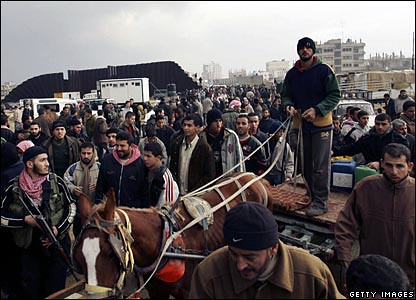
Palestinians return to Gaza after the wall separating them from Egypt was blown up. Israel has been attempting to starve the population for several weeks., a photo by Pan-African News Wire File Photos on Flickr.
Egypt's Morsi begins 'new era' with Palestinians
Bradley Hope
Jul 20, 2012
In hosting Mr Meshaal in the Egyptian capital just one day after consultations with Mahmoud Abbas, the president of the Palestinian Authority, Mr Morsi appeared to commit himself more deeply to efforts aimed at reconciling the two main Palestinian factions, which have been at odds since Hamas took over the Gaza Strip in 2007.
Mr Morsi, whose Muslim Brotherhood is ideologically related to Hamas, affirmed his support for the Palestinians in the Gaza Strip that is ruled by Hamas, Mr Meshaal said after the meeting.
"Morsi affirmed Egypt's support for Palestinians in Gaza, which confirms a new era in relations between Egypt and the Palestinian cause," said Mr Meshaal, in comments published by the official Egyptian news agency Mena.
Mr Morsi's predecessor, Hosni Mubarak, who was toppled last year by a popular uprising in Egypt, never officially met with leaders of Hamas during his reign as president. He instead gave the Egyptian intelligence agency wide latitude to negotiate with Hamas in Gaza, while he fostered stronger ties with its rival Fatah in the West Bank.
Mr Morsi is attempting to strike a more balanced approach to the Palestinian deadlock.
Khaled Alqazzaz, the coordinator of foreign relations for the Freedom and Justice Party, the political arm of the Muslim Brotherhood to which Mr Morsi is still closely allied, said recently that Egypt would not be biased in favour of Hamas in the struggle for Palestinians to form a unified government.
"There were players in the previous regime that were biased to one party," Mr Alqazzaz told The National. "We will be a better mediator. We are collaborating with the different groups to help them have a unified voice."
Still, Mr Morsi is hampered by uncertainties about his presidential powers and concerns about angering Israel, which could affect ties with the United States, analysts said.
He has strong ideological ties to Hamas, established in 1987 as an offshoot of the Muslim Brotherhood. Mr Morsi officially resigned as a senior member of the Brotherhood upon taking office, but he is still viewed as closely allied with the group and its political arm, the Freedom and Justice Party.
Mr Morsi's challenge is to balance Egypt's ties with Hamas and Fatah after years of giving Fatah preferential treatment. Meanwhile, Hamas is hoping that the election of a former Muslim Brotherhood official as Egypt's president will bring an end to the blockade on Gaza.
To the chagrin of some Palestinians, especially in Gaza, the new president has taken a more cautious stance to opening up trade with the Palestinian enclave. He is said to fear that Gaza could grow still further away from the West Bank, become a ward of Egypt and hurt the Palestinians' chances of establishing a state.
Nobody is certain what Mr Morsi will do, said Nadia Hijab, the director of Al-Shabaka, a network of Palestinian policy experts.
"Will Morsi and the Brothers help to lift the siege on Gaza - which makes life a misery for the Palestinians of Gaza - or have the power to do so? Hamas has been waiting and hoping that the political rise of the Egyptian Brothers would give them an upper hand in negotiations with Fatah - one reason that reconciliation efforts have gone nowhere so far."
On Wednesday, Mr Abbas, who is also chairman of the Palestine Liberation Organisation and Fatah, pressed Mr Morsi during their meeting to persuade Hamas to allow elections to take place as planned, said Raghib Naeem, the head of the Fatah office in Cairo.
"Whoever will win, Abbas is ready to give him the authority on a plate of gold," said Mr Naeem. But, he added, Hamas was preventing the electoral committee from registering thousands of new voters.
Mr Morsi's forays into shuttle diplomacy between the two main Palestinian factions may be hobbled by uncertainties surrounding his powers. The Supreme Council of the Armed Forces gave itself greater powers and curtailed the roles of the executive branch before he was inaugurated. The legal dispute could prevent the president from taking over sensitive areas of the government, including foreign affairs or intelligence services.
"There has been a greater flexibility in dealing with the Palestinians since Mubarak left power," said Geoffrey Aronson, the director of research at the Foundation for Middle East Peace in Washington, DC. "There is a less visceral antipathy toward Hamas that was the case previously. But we can't point to any remarkable progress on the reconciliation, and there is a question about who is going to make the decisions on this in the new Egypt."
Mr Morsi also has national security issues related to Gaza to discuss with Hamas, analysts said. Gaza-based militants are widely believed to be supporting groups that have bombed an Egyptian gas pipeline to Israel 14 times and fired missiles over the border into Israel.
"The immediate concern of Egypt is to open up a discussion about Hamas's role in Sinai, whether it's related to weapons smuggling or allowing extremists to have a settlement or base in the north," said Abdel Moneim Said Aly, the head of the Al Ahram Centre for Political and Strategic Studies.
"For Egyptians, this should come first as a matter of national security," he said.
bhope@thenational.ae
* With additional reporting by Hugh Naylor
No comments:
Post a Comment